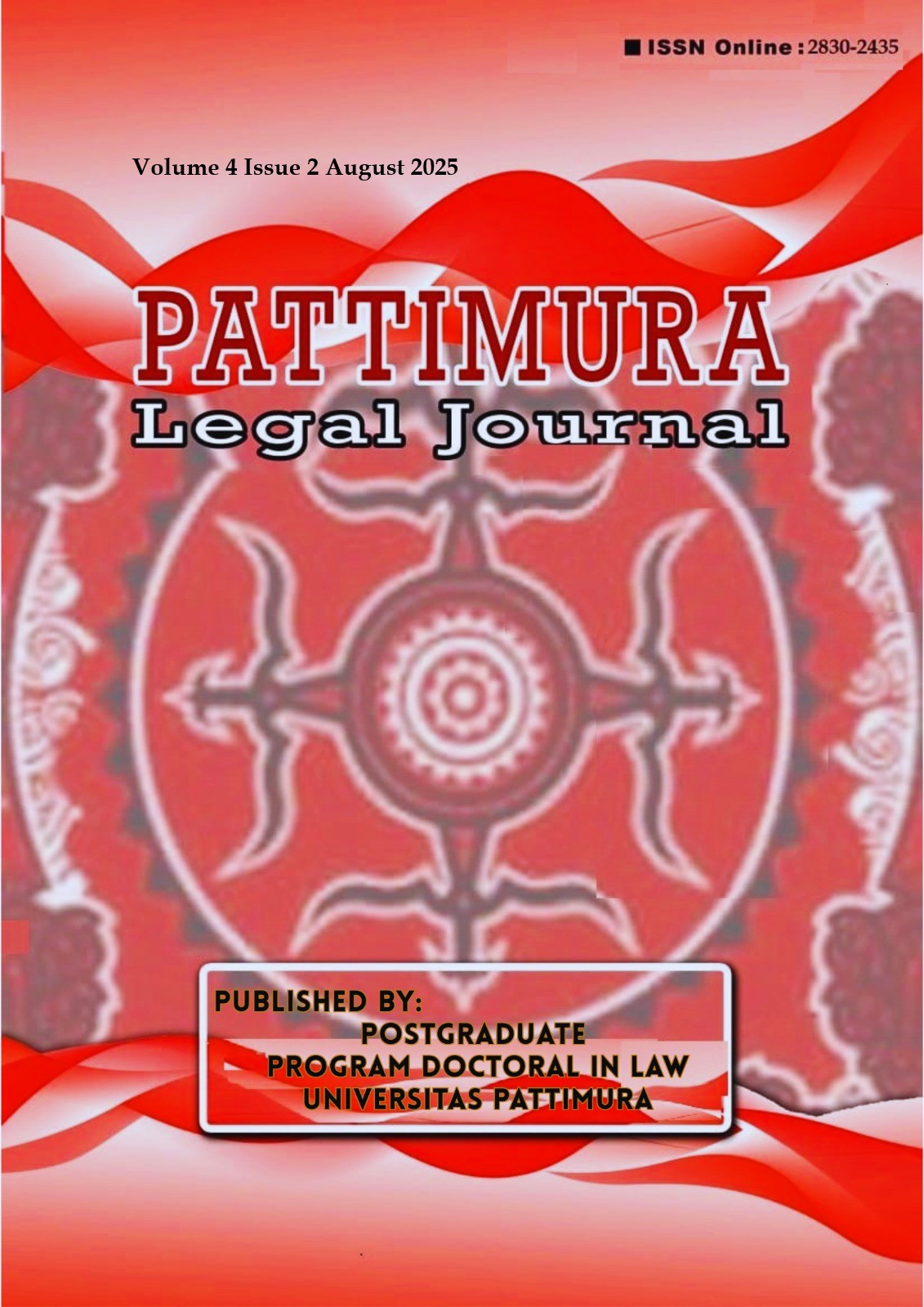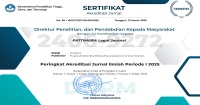The Effectiveness of the Coal Mining Licensing System in the Implementation of Sustainable Development Goals
Abstract
Introduction: The mining licensing system is a key instrument in controlling coal exploitation activities to achieve sustainable development targets after the adoption of the 2015 Sustainable Development Goals (SDGs). However, there are problems in the licensing function as an environmental impact control mechanism and disparities between national regulations and policy implementation at the regional level that hinder the achievement of sustainable mining goals.
Purposes of the Research: The purpose of writing this article is to evaluate the effectiveness of the coal sector licensing mechanism in Jambi City in adopting SDGs values and examine the challenges of implementing sustainable mining policies at the local level.
Methods of the Research: The research uses a qualitative approach with a descriptive analysis method on the mining licensing system in Jambi City. Data collection techniques through documentation studies on regional licensing policies, Mayor's regulations in the field of mining, regulations on coal sector control, and analysis of literature from relevant scientific sources.
Results Main Findings of the Research: The research reveals that the coal licensing system in Jambi City has adopted the principles of SDGs 12 (responsible consumption and production) through the Decree of the Mayor of Jambi Number 54 of 2023 concerning the control of coal transportation, the optimization of the licensing function as an environmentally friendly production control tool, and the establishment of a multi-agency coordination system in the supervision of responsible production practices, However, there are still weaknesses in the implementation of sanctions and the synchronization of central and regional policies.
Downloads
References
Creswell, John W, and J. David Creswell. Research Design: Qualitative, Quantitative Adn Mixed Methods Approaches. London: Sage Publications Lt, 2017.
Dwijayanto, Angga. “Mengenal Izin Usaha Pertambangan (IUP).” klikpajak.id, 2022. https://klikpajak.id/blog/iup-izin-usaha-pertambangan/.
Febryanti, and Aldri Alfrinardi. “Kebijakan Pemerintah Kota Jambi Terhadap Pengelolaan Sampah Dalam Memenuhi Prinsip Good Environmental Governance.” Gudang Jurnal Multidisiplin Ilmu 2, no. 1 (2024): 202–6. https://gudangjurnal.com/index.php/gjmi/article/view/223.
Firmansyah, Muhammad, Masrun, and I Dewa Ketut Yudha S. “Esensi Perbedaan Metode Kualitatif Dan Kuantitatif.” Elastisitas: Jurnal Ekonomi Pembangunan 3, no. 2 (2021): 156–59. https://elastisitas.unram.ac.id/index.php/elastisitas/article/view/46.
Herman, Hendra, and Yeni Widowaty. “Perlindungan Hukum Terhadap Masyarakat Atas Kegiatan Stockpile Batubara Di Kabupaten Muaro Jambi.” Bina Hukum Lingkungan 8, no. 2 (2024): 235–58. https://doi.org/10.24970/bhl.v8i2.256.
Hutapea, Leonardo Halomoantua. “Formulasi Hukum Sistem Insentif Perizinan Pertambangan Batubara Untuk Efisiensi Penggunaan Sumber Daya Alam Dalam Perspektif Economic Analysis of Law.” Jurnal Ilmu Hukum, Humaniora Dan Politik 5, no. 1 (2024): 495–506. https://doi.org/10.38035/jihhp.v5i1.3078.
Lathif, Nazaruddin. “Tinjauan Yuridis Tentang Kewenangan Pemerintah Provinsi Dalam Penerbitan Izin Usaha Pertambangan Batubara.” Jurnal Panorama Hukum 2, no. 2 (2017): 149–66. https://doi.org/10.21067/jph.v2i2.2076.
Luhukay, Roni Sulistyanto, and Rachmasari Kusuma Dewi. “Sentralisasi Kewenangan Perizinan Usaha Oleh Pemerintah Pusat Dalam Rancangan Undang–Undang Mineral Dan Batubara.” Al-’Adl 13, no. 2 (2020): 265–84. https://doi.org/10.31332/aladl.v13i2.1861.
Najicha, Fatma Ulfatun, I Gusti Ayu Ketut Rachmi Handayani, and Lego Karjoko. “Regulation of Law Enforcement in Prevention and Handling of Fire Forest in Environmental Hazards.” Medico-Legal Update 21, no. 1 (2021): 259–62. https://doi.org/10.37506/mlu.v21i1.2314.
Suryani, Nilma, Armansyah, and Hafiza Yetti. “Dampak Pertambangan Batu Bara Terhadap Kondisi Sosial Ekonomi Masyarakat Lokal Di Kota Jambi.” UNES Law Review 7, no. 1 (2024): 345–53. https://doi.org/10.31933/unesrev.v7i1.
Suwandi, and Teuku Muhammad Valdy Arief. “Truk Batu Bara Dilarang Masuk Kota Jambi, Ada Denda Rp 50 Juta.” Kompas.com, 2023. https://regional.kompas.com/read/2023/01/26/111654478/truk-batu-bara-dilarang-masuk-kota-jambi-ada-denda-rp-50-juta?page=all.
Syahhuri, Sunardi, and Budiman. “Efektivitas Pengawasan Perizinan Tambang Batu Bara Oleh Dinas Energi Dan Sumber Daya Mineral (ESDM) Provinsi Kaltim Di Kota Samarinda.” Jurnal Ilmu Pemerintahan 9, no. 1 (2021): 32–41. https://doi.org/10.30872/jip.v9i1.763.
Syarif, Afif. “Pengelolaan Pertambangan Batu Bara Dalam Penegakan Hukum Lingkungan Pasca Otonomi Daerah Di Provinsi Jambi.” Arena Hukum 13, no. 2 (2020): 264–77. https://doi.org/10.21776/ub.arenahukum.2020.01302.4.
Syawal, Fauzi, Abdul Bari Azed, and Suzanalisa. “Kebijakan Hukum Pidana Dalam Penanggulangan Dampak Lingkungan Hidup Akibat Pengusahaan Pertambangan Batubara Di Kabupaten Sarolangun.” Legalitas: Jurnal Hukum 9, no. 1 (2019): 17–45. https://legalitas.unbari.ac.id/index.php/legalitas/article/view/141.
Syofiarti. “Peran Serta Masyarakat Dalam Pengambilan Keputusan Pada Kegiatan Pertambangan Untuk Mewujudkan Pembangunan Berkelanjutan.” Refleksi Hukum: Jurnal Ilmu Hukum 7, no. 1 (2022): 19–36. https://doi.org/10.24246/jrh.2022.v7.i1.p19-36.
Yulianingrum, Aullia Vivi, and Yohana Widya Oktaviani. “Kebijakan Pengelolaan Pertambangan Batubara Yang Berorientasi Pada Sustainable Development Goals Di Wilayah IKN, Indonesia.” Jurnal Analisis Hukum 6, no. 2 (2023): 229–45. https://doi.org/10.38043/jah.v6i2.4670.
Copyright (c) 2025 Arrie Budhiartie, Ridha Aulia Zarifah, Deco Anderson Valentino, Diva Puspita Aprilia, Zahra Deffiana, Yusupha Jabbi (Author)

This work is licensed under a Creative Commons Attribution-NonCommercial 4.0 International License.
Authors who publish their manuscripts in this Journal agree to the following conditions:
- The copyright in each article belongs to the author, as well as the right to patent.
- Authors are able to enter into separate, additional contractual arrangements for the non-exclusive distribution of the journal's published version of the work (e.g., post it to an institutional repository or publish it in a book), with an acknowledgment of its initial publication in this journal.
- Authors are permitted and encouraged to post their work online (e.g., in institutional repositories or on their website) prior to and during the submission process, as it can lead to productive exchanges, as well as earlier and greater citation of published work.
- Authors have the right to self-archiving of the article (Author Self-Archiving Policy)






















